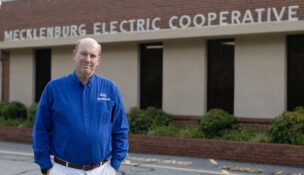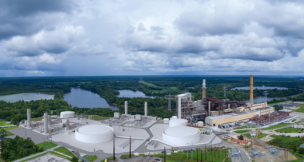Broadband, renewable energy focuses for rural development, USDA administrator says
Investing in Rural America conference held in Roanoke
Beth JoJack //May 21, 2024//

Andrew Berke, administrator of the U.S. Rural Utilities Service, opened the Investing in Rural America conference at the Hotel Roanoke on Tuesday. Photo courtesy Federal Reserve Bank of Richmond.

Andrew Berke, administrator of the U.S. Rural Utilities Service, opened the Investing in Rural America conference at the Hotel Roanoke on Tuesday. Photo courtesy Federal Reserve Bank of Richmond.
Broadband, renewable energy focuses for rural development, USDA administrator says
Investing in Rural America conference held in Roanoke
Beth JoJack //May 21, 2024//
Rural communities can improve their economy and quality of life, Andrew Berke, administrator for the U.S. Department of Agriculture’s Rural Utilities Service, stressed during the opening of the fifth annual Investing in Rural America conference, held Tuesday at the Hotel Roanoke & Conference Center.
The Federal Reserve Bank of Richmond hosts the two-day Investing in Rural America conference, which tackles topics like driving community investment in rural places and innovative housing strategies.
Berke began his talk by noting he was born in Chattanooga, Tennessee, in 1968, the year before CBS Evening News anchor Walter Cronkite called it “the dirtiest city in America.” The U.S. government went on to pass the Clean Air Act and the Clean Water Act in 1970 and 1972.
In Chattanooga, business leaders made a plan to build businesses and attractions along the Tennessee River through public-private partnerships. Fast-forward to 2011 and 2015, and Outside magazine dubbed Chattanooga the “Best Town Ever.”
During Berke’s 2013 to 2021 tenure as Chatanooga’s mayor, his city administration developed a municipally-owned 10-gigabit network available to every home and business in a 600-mile area. “That transformed our economy,” Berke said. “We had one of the highest wage growths in the country. “
The 2021 Bipartisan Infrastructure Law allocated $65 billion to improve access to high-speed internet. “We just in the last year did $2.5 billion of new high-speed internet connections throughout rural America,” Berke said.
The most recent Virginia state budget, passed by the General Assembly and signed by Gov. Glenn Youngkin on May 13, includes $50 million over two years for the Virginia Telecommunication Initiative to administer broadband deployment.
Greater broadband access allows families to live higher quality lives and means young people don’t have to move to big cities for work, Berke pointed out. “In 2024, there’s more opportunity to do whatever job you want from whatever location you want and still be successful,” he said.
The Biden administration is also aiding rural America through the Inflation Reduction Act, which Berke described as the “largest investment in rural electrification since the founding of my agency almost 90 years ago.”
Roughly $11 billion will go to helping rural energy and utility providers bring renewable energy to their communities, according to Berke. “Our $11 billion will do roughly $40 billion worth of clean energy work,” he said, “because it’s $3 of private investment for every grant dollar that you get.”
The majority of grantees for the money are rural electric cooperatives, according to Berke.
“Rural electric co-ops as a community are about 75% more carbon-intensive than most investor-owned utilities, and so, they have further to go in making this transition,” he said. “It’s going to be building solar arrays and wind farms and putting up carbon capture sequestration and potentially even new nuclear or revised nuclear sites.”
Berke acknowledged there’s been “a big push in rural America to talk about how difficult or how troubled clean energy is,” and that renewable energy projects like solar farms can be problematic by taking up agricultural land.
In Henry County, down the road from the conference, the board of supervisors recently approved an amendment limiting the total amount of acreage in the county that can be used for solar farm development to 1% of the county’s total land mass.
“You’re seeing hundreds of bans on clean energy projects going on around the country,” Berke said. “That is very challenging if we’re going to reduce our pollution and forge a future ahead in this industry.”
e
















